一般来说,编程语言中,库、包、模块是同一种概念,是代码的组织方式。
Python中只有一种模块对象,但是为了模块化组织模块的便利,提供了一个概念——包!
模块(module):指的是Python的源代码文件。
包(package):是的是模块组织在一起的包名同名的目录及其相关文件。
导入语句
import 模块1,模块2:这是完全导入(导入不建议用逗号分隔写成一行,可以多个导入)
import……as……:模块别名
import语句
- 知道指定的模块,加载和初始化它,生成模块对象,找不到,抛出ImportError异常。
- 在import所在的作用域的局部命名空间中(比如在py文件和函数内导入的作用域就不同),增加名称和上一步创建的对象关联。
单独运行下面的例子,体会其区别
import functools print(dir()) print(functools) print(functools.wraps)#import的本质是找到它,单独加载它,初始化它,生成一个模块对象,在当前模块中增加名称。映射到模块对象中。 结果为: ['In', 'Out', '_', '__', '___', '__builtin__', '__builtins__', '__doc__', '__loader__', '__name__', '__package__', '__spec__', '_dh', '_i', '_i1', '_i2', '_i3', '_i4', '_ih', '_ii', '_iii', '_oh', 'exit', 'functools', 'get_ipython', 'quit'] <module 'functools' from 'f:\\Anaconda3\\lib\\functools.py'> <function wraps at 0x01C41E40>
可以看到模块加载到了当前文件中,加入了它的名称, 它的名称属于当前模块中了。
import os.path#导入os.path,os加入当前名词空间,而不是os.path,这样写还不如写import os print(dir()) print(os) print(os.path)#完成限定名词访问path 结果为: ['In', 'Out', '_', '__', '___', '__builtin__', '__builtins__', '__doc__', '__loader__', '__name__', '__package__', '__spec__', '_dh', '_i', '_i1', '_i2', '_i3', '_i4', '_i5', '_ih', '_ii', '_iii', '_oh', 'exit', 'functools', 'get_ipython', 'os', 'quit'] <module 'os' from 'f:\\Anaconda3\\lib\\os.py'> <module 'ntpath' from 'f:\\Anaconda3\\lib\\ntpath.py'>
import os.path as osp#导入os.path并赋值给osp print(dir()) print(osp) 结果为: ['In', 'Out', '_', '__', '___', '__builtin__', '__builtins__', '__doc__', '__loader__', '__name__', '__package__', '__spec__', '_dh', '_i', '_i1', '_i2', '_i3', '_i4', '_i5', '_i6', '_ih', '_ii', '_iii', '_oh', 'exit', 'functools', 'get_ipython', 'os', 'osp', 'quit'] <module 'ntpath' from 'f:\\Anaconda3\\lib\\ntpath.py'>
总结:
导入顶级模块,其名称会加入到本地名词空间中,并绑定到其模块对象。
导入非顶级模块,只将其顶级模块名称加入到本地名词空间中,导入的模块必须使用完全限定名称来访问。
如果使用了as,as后的名称直接绑定到导入的模块对象,并将该名称加入到本地名词空间中。
from……import……部分导入
from……import……as……:别名
from pathlib import Path,PosixPath#在当前名词空间导入该模块指定的成员,两个类 print(dir()) 结果为: ['In', 'Out', 'Path', 'PosixPath', '_', '__', '___', '__builtin__', '__builtins__', '__doc__', '__loader__', '__name__', '__package__', '__spec__', '_dh', '_i', '_i1', '_ih', '_ii', '_iii', '_oh', 'exit', 'get_ipython', 'quit']
from pathlib import * #在当前名词空间导入该模块所有公共成员(非下划线开头成员)或指定成员,不建议这样导入 print(dir()) 结果为: ['In', 'Out', 'Path', 'PosixPath', 'PurePath', 'PurePosixPath', 'PureWindowsPath', 'WindowsPath', '_', '__', '___', '__builtin__', '__builtins__', '__doc__', '__loader__', '__name__', '__package__', '__spec__', '_dh', '_i', '_i1', '_i2', '_ih', '_ii', '_iii', '_oh', 'exit', 'get_ipython', 'quit']
from functools import wraps as wr,partial #别名 print(dir()) 结果为: ['In', 'Out', '_', '__', '___', '__builtin__', '__builtins__', '__doc__', '__loader__', '__name__', '__package__', '__spec__', '_dh', '_i', '_i1', '_ih', '_ii', '_iii', '_oh', 'exit', 'get_ipython', 'partial', 'quit', 'wr']
from os.path import exists#加载,初始化os,os.path模块,exists加入到本地名词空间并绑定 if exists("f:/xpc"): print("found") else: print("not found") print(dir()) print(exists) import os #如果不导入后面就会报错
#下面四种方式获得同一个对象
print(os.path.exists) print(exists) print(os.path.__dict__["exists"]) print(getattr(os.path,"exists")) 结果为: found ['In', 'Out', '_', '__', '___', '__builtin__', '__builtins__', '__doc__', '__loader__', '__name__', '__package__', '__spec__', '_dh', '_i', '_i1', '_i2', '_ih', '_ii', '_iii', '_oh', 'exists', 'exit', 'get_ipython', 'quit'] <function exists at 0x01393738> <function exists at 0x01393738> <function exists at 0x01393738> <function exists at 0x01393738> <function exists at 0x01393738>
总结:
找到from子句中指定的模块,加载并初始化它(注意不是导入)
对于import子句后的名称
- 先查from子句导入的模块是否具有该名称的属性
- 如果不是,则尝试导入该名称的子模块
- 还没有找到,则抛出ImportError异常
- 这个名称保存到本地名词空间中,如果有as子句,则使用as子句后的名称。
from pathlib import Path #导入类path print(Path,id(Path)) import pathlib as p1#导入模块使用别名 print(dir()) print(p1) print(p1.Path,id(p1.Path))#可以看出导入的名词path和p1.path是统一对象 结果为: <class 'pathlib.Path'> 25771056 ['In', 'Out', 'Path', '_', '__', '___', '__builtin__', '__builtins__', '__doc__', '__loader__', '__name__', '__package__', '__spec__', '_dh', '_i', '_i1', '_ih', '_ii', '_iii', '_oh', 'exit', 'get_ipython', 'p1', 'quit'] <module 'pathlib' from 'f:\\Anaconda3\\lib\\pathlib.py'> <class 'pathlib.Path'> 25771056
自定义模块
自定义模块,.py文件就是一个模块。
#tst1.py文件
print("this is test1 module")
class A:
def showmodule(self):
print("{}.a = {}".format(self.__module__, self))
print(self.__class__.__name__)
a = A()
a.showmodule()
结果为:
this is test1 module
__main__.a = <__main__.A object at 0x00000000026C5B48>
A
#test2.py文件
print("this is test2 module")
import test1
print(dir)
b = test1.A()
b.showmodule()
结果为:
this is test2 module
this is test1 module
test1.a = <test1.A object at 0x0000000001E95C88>
A
<built-in function dir>
test1.a = <test1.A object at 0x000000000058F308>
A
#test3 from test1 import A as cls a = cls() a.showmodule() 结果为: this is test1 module test1.a = <test1.A object at 0x00000000026B5D08> A test1.a = <test1.A object at 0x0000000001DF0188> A
上面三个文件都在同一个目录下。可以看到各个模块都是独立运行的。
自定义模块命名规范
- 模块名就是文件名
- 模块名必须符合标识符的要求,是非数字开头的字母数字和下划线的组合,像test-module.py这样的文件名不能作为模块名。
- 不要使用系统模块名来避免冲突,除非你明确知道这个模块名的用途
- 通常模块名为全小写,下划线来分割。
模块搜索顺序
使用sys.path查看搜索顺序
import sys for p in sys.path: print(p) 结果为: F:\xpc f:\Anaconda3\python37.zip f:\Anaconda3\DLLs f:\Anaconda3\lib f:\Anaconda3 f:\Anaconda3\lib\site-packages f:\Anaconda3\lib\site-packages\win32 f:\Anaconda3\lib\site-packages\win32\lib f:\Anaconda3\lib\site-packages\Pythonwin f:\Anaconda3\lib\site-packages\IPython\extensions C:\Users\Administrator\.ipython
显示结果为,Python模块的路径搜索顺序
当加载一个模块的时候,需要从这些搜索路径中从前到后一次查找,并不搜索这些目录的子目录,搜索到模块就加载,搜索不到就抛异常。
路径可以为字典、zip文件、egg文件。
.egg文件,由setuptools库创建的包,第三方库常用的格式,添加了元数据(版本号、依赖项等)信息的zip文件。
路径顺序为:
程序主目录,程序运行的主程序脚本所在的目录。
Pythonpath目录,环境变量Pythonpath设置的目录也是搜索模块的路径。
标准库目录,Python自带的库模块所在目录。
sys.path可以被修改,追加新的目录。
模块的重复导入
print("this is test1 module") class A: def showmodule(self): print("{}.a = {}".format(self.__module__, self)) print(self.__class__.__name__) a = A() a.showmodule() 结果为: this is test1 module __main__.a = <__main__.A object at 0x0000000001E65B08> A
import test1 print("local module") import test1 import test1 结果为: this is test1 module test1.a = <test1.A object at 0x0000000001EB87C8> A local module
在上面的例子中导入几个test1。从运行的结果来看,不会产生重复导入的问题。
所有加载的模块都会记录在sys.modules中,sys.modules是存储已经加载过的所有模块的字典。
模块运行
__name__,每个模块都会定义一个__name__特殊变量来存储当前模块的名称,如果不指定,则默认源代码文件名,如果是包则有限定名。
import os.path import sys import test1 print("++++++++++++++++++++++++++++") print(sys.modules["__main__"]) print(dir()) 结果为: ++++++++++++++++++++++++++++ <module '__main__' from 'C:/Users/Administrator/PycharmProjects/studytset/xpc1/test1.py'> ['__builtins__', '__cached__', '__doc__', '__file__', '__loader__', '__name__', '__package__', '__spec__', 'os', 'sys', 'test1'] ++++++++++++++++++++++++++++ <module '__main__' from 'C:/Users/Administrator/PycharmProjects/studytset/xpc1/test1.py'> ['__annotations__', '__builtins__', '__cached__', '__doc__', '__file__', '__loader__', '__name__', '__package__', '__spec__', 'os', 'sys', 'test1']
解释器初始化的时候,会初始化sys.modules字典(保存已加载的模块),创建builtins(全局函数、常量)模块,__main__模块,sys模块,以及模块搜索路劲sys.path。
Python是脚本语言,任何一个脚本都可以直接执行,也可以作为模块被导入。
当从标准输入(命令行方式敲代码)、脚本(Python test.py)或交互式读取的时候,会将模块的__name__设置为__main__,模块的顶层代码就在__main__这个作用域中执行。顶层代码:模块中缩进最外层的代码。
如果import导入的,其__name__默认就是模块名。
#test1.py文件 import test2
结果为:
in import module
#test2.py文件 #判断模块是否以程序的方式运行 if __name__ =="__main__": print("in __mian__")#程序的方式运行的代码 else: print("in import module")#模块导入的方式运行的代码
结果为:
in __mian__
if __name__ == "__main__"用途
- 本模块的功能测试,对于非主模块,测试本模块内的函数,类。
- 避免主模块变更的副作用。顶层代码,没有封装,主模块使用时没有问题,但是,一旦有了新的主模块,老的主模块成了被导入模块,由于原来代码没有封装,一并执行了。
模块的属性
__file__:字符串,源文件路径
__cached__:字符串,编译后的字节码文件路径
__spec__:显示模块的规范。
__name__:模块名
__package__:当模块是包,同__name__;否则,可以设置为顶级模块的空字符串。
包
包是特殊的模块
Python模块支持目录吗?
实验
项目中新建一个目录m,使用下面的代码。

import m print(dir()) print(type(m)) print(m) 结果为: ['__annotations__', '__builtins__', '__cached__', '__doc__', '__file__', '__loader__', '__name__', '__package__', '__spec__', 'm'] <class 'module'> <module 'm' (namespace)>
如果在m目录下再新建一个xpython文件,就可以导入。
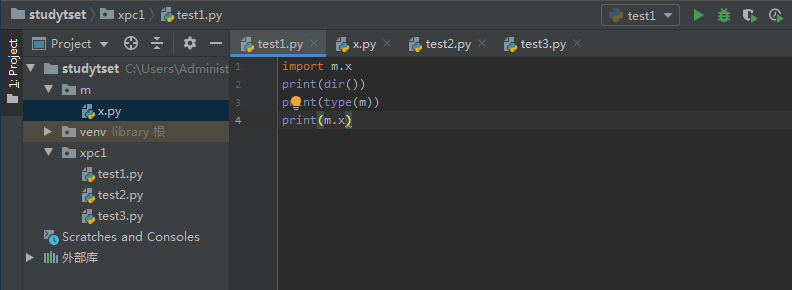
import m.x print(dir()) print(type(m)) print(m.x)
结果为:
['__annotations__', '__builtins__', '__cached__', '__doc__', '__file__', '__loader__', '__name__', '__package__', '__spec__', 'm']
<class 'module'>
<module 'm.x' from 'C:\\Users\\Administrator\\PycharmProjects\\studytset\\m\\x.py'>
结果可以看到,可以导入目录,目录也是文件,所以可以导入,不过问题是,目录模块怎么写入代码?
为了解决这个问题,python要求在目录下建立一个特殊文件__init__.py,在其中写入代码。
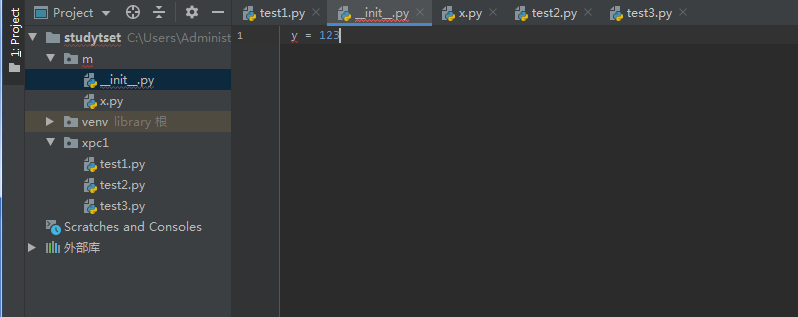
在继续运行上面的test看看能不能打印出y.
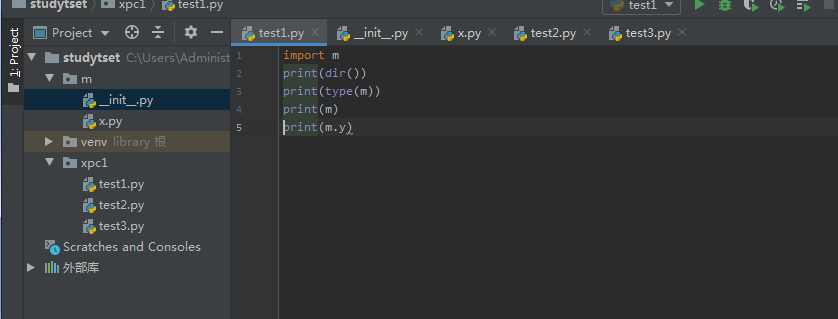
['__annotations__', '__builtins__', '__cached__', '__doc__', '__file__', '__loader__', '__name__', '__package__', '__spec__', 'm'] <class 'module'> <module 'm' from 'C:\\Users\\Administrator\\PycharmProjects\\studytset\\m\\__init__.py'> 123
结果可以看到,y打印出来了。
python中,目录可以 作为模块,这就是包,不过代码需要写在该目录下__init__.py中。
目录和packege区别就是package创建会默认创建一个__init__文件。
子模块
包目录下的py文件、子目录都是其子模块。注意的是__init__是包自己的,它不是子模块。

如上建立子模块目录和和文件,所有的py文件中就写一句话,print(__name__)
#注意查看模块的加载,当前名词空间 import m.m1.m2 print(dir()) import sys print(sorted(filter(lambda x:x.startswith("m"),sys.modules.keys())))
删除__init__.py试一试,可以发现删除并不影响导入,但是这不是良好的习惯,请保留__init__.py文件。
模块和包的总结
包能够更好地组织模块,尤其是大的模块代码行数很多,可以把它拆分成很多子模块,便于使用某些功能就加载相应的子模块。
包目录中__init__.py是在包第一次导入的时候就会执行,内容可以为空,也可以是用于该包初始化工作的代码,最好不要删除它(低版本不可删除)
导入子模块一定会加载父模块,但是导入父模块一定不会导入子模块。
包目录之间只能使用.号作为分隔符,表示模块及其子模块的层级关系。
模块也是封装,如同,类,函数,不过它能够封装变量,类,函数。
模块就是命名空间,其内部的顶层标识符,都是它的属性,可以通过__dict__或dir(module)查看。
包也是模块,但模块不一定是包,包是特殊的模块,是一种组织方式,它包含__path__属性。
问题
from json import encoder 之后,json.dump函数用不了,为什么?
import json.encoder之后呢?json.dump函数能用吗?
原因是from json import encoder之后,当前名次空间没有json,但是json模块已经加载过了,没有json的引用,无法使用dump函数。
import json.encoder也加载json模块,但是当前名词空间有json,因此可以调用。
绝对导入,相对导入
绝对导入
在import语句或者from导入模块,模块名称最前面不是以点开头的。
绝对导入总是去搜索模块搜索路径中找。
相对导入
只能在包内使用,且只能用在from语句中。
使用.点号,表示当前目录内。
..表示上一级目录
不要在顶层模块中使用相对导入。
举例a.b.c模块,c是模块,c的代码总,使用
from . import d #imports a.b.d
from .. import e #import a.e
from .d import x #a.b.d.x
form ..e import x #a.e.x
...三点表示上上一级。
使用下面结构的包,体会相对导入的使用。
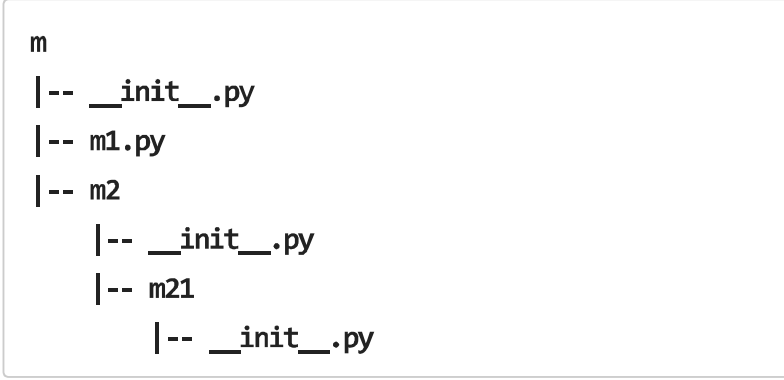
测试一下有相对导入语句的模块,能够直接运行吗?
不能,很好理解,使用相对导入的模块就是为了内部互相的引用资源的,不是为了直接运行的,对于包来说,正确的使用方式还是在顶级模块中使用这些包。
访问控制
下划线开头的模块名
_或__开头的模块是否能够被导入呢?
创建文件名为_xyz.py或__xyz.py测试。
都可以成功的导入,因为它们都是合法标识符,就可以用作模块名。
应该注意使用*导入,下划线,双下导入导入是不会成功的。非要自己取也是可以导入的。
模块内的标识符
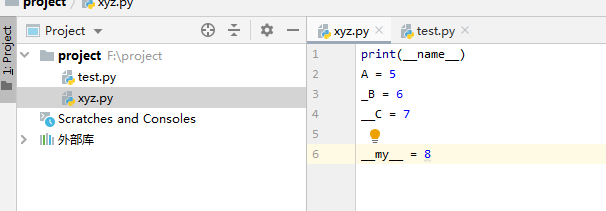
#xyz.py print(__name__) A = 5 _B = 6 __C = 7 __my__ = 8
import xyz import sys print(sorted(sys.modules.keys())) print(dir()) print(xyz.A,xyz._B,xyz.__C,xyz.__my__) 结果为: xyz ['__future__', '__main__', '_abc', '_ast', '_bisect', '_blake2', '_bootlocale', '_bz2', '_codecs', '_codecs_cn', '_collections', '_collections_abc', '_compat_pickle', '_compression', '_ctypes', '_cython_0_29_12', '_datetime', '_decimal', '_frozen_importlib', '_frozen_importlib_external', '_functools', '_hashlib', '_heapq', '_imp', '_io', '_json', '_locale', '_lzma', '_multibytecodec', '_opcode', '_operator', '_pickle', '_random', '_sha3', '_signal', '_sitebuiltins', '_socket', '_sre', '_stat', '_string', '_struct', '_thread', '_warnings', '_weakref', '_weakrefset', '_winapi', 'abc', 'argparse', 'ast', 'atexit', 'bisect', 'builtins', 'bz2', 'codecs', 'collections', 'collections.abc', 'contextlib', 'copy', 'copyreg', 'ctypes', 'ctypes._endian', 'cycler', 'cython_runtime', 'datetime', 'dateutil', 'dateutil._version', 'decimal', 'difflib', 'dis', 'distutils', 'distutils.version', 'encodings', 'encodings.aliases', 'encodings.gbk', 'encodings.latin_1', 'encodings.utf_8', 'enum', 'errno', 'fnmatch', 'functools', 'gc', 'genericpath', 'gettext', 'glob', 'gzip', 'hashlib', 'heapq', 'importlib', 'importlib._bootstrap', 'importlib._bootstrap_external', 'importlib.abc', 'importlib.machinery', 'importlib.util', 'inspect', 'io', 'itertools', 'json', 'json.decoder', 'json.encoder', 'json.scanner', 'keyword', 'kiwisolver', 'linecache', 'locale', 'logging', 'lzma', 'marshal', 'math', 'matplotlib', 'matplotlib._color_data', 'matplotlib._version', 'matplotlib.cbook', 'matplotlib.cbook.deprecation', 'matplotlib.colors', 'matplotlib.fontconfig_pattern', 'matplotlib.ft2font', 'matplotlib.rcsetup', 'mkl_fft', 'mkl_fft._float_utils', 'mkl_fft._numpy_fft', 'mkl_fft._pydfti', 'mkl_fft._version', 'mpl_toolkits', 'msvcrt', 'mtrand', 'nt', 'ntpath', 'numbers', 'numpy', 'numpy.__config__', 'numpy._distributor_init', 'numpy._globals', 'numpy._mklinit', 'numpy._pytesttester', 'numpy.compat', 'numpy.compat._inspect', 'numpy.compat.py3k', 'numpy.core', 'numpy.core._add_newdocs', 'numpy.core._dtype', 'numpy.core._dtype_ctypes', 'numpy.core._internal', 'numpy.core._methods', 'numpy.core._multiarray_tests', 'numpy.core._multiarray_umath', 'numpy.core._string_helpers', 'numpy.core._type_aliases', 'numpy.core.arrayprint', 'numpy.core.defchararray', 'numpy.core.einsumfunc', 'numpy.core.fromnumeric', 'numpy.core.function_base', 'numpy.core.getlimits', 'numpy.core.info', 'numpy.core.machar', 'numpy.core.memmap', 'numpy.core.multiarray', 'numpy.core.numeric', 'numpy.core.numerictypes', 'numpy.core.overrides', 'numpy.core.records', 'numpy.core.shape_base', 'numpy.core.umath', 'numpy.ctypeslib', 'numpy.fft', 'numpy.fft.fftpack', 'numpy.fft.fftpack_lite', 'numpy.fft.helper', 'numpy.fft.info', 'numpy.lib', 'numpy.lib._datasource', 'numpy.lib._iotools', 'numpy.lib._version', 'numpy.lib.arraypad', 'numpy.lib.arraysetops', 'numpy.lib.arrayterator', 'numpy.lib.financial', 'numpy.lib.format', 'numpy.lib.function_base', 'numpy.lib.histograms', 'numpy.lib.index_tricks', 'numpy.lib.info', 'numpy.lib.mixins', 'numpy.lib.nanfunctions', 'numpy.lib.npyio', 'numpy.lib.polynomial', 'numpy.lib.scimath', 'numpy.lib.shape_base', 'numpy.lib.stride_tricks', 'numpy.lib.twodim_base', 'numpy.lib.type_check', 'numpy.lib.ufunclike', 'numpy.lib.utils', 'numpy.linalg', 'numpy.linalg._umath_linalg', 'numpy.linalg.info', 'numpy.linalg.lapack_lite', 'numpy.linalg.linalg', 'numpy.ma', 'numpy.ma.core', 'numpy.ma.extras', 'numpy.matrixlib', 'numpy.matrixlib.defmatrix', 'numpy.polynomial', 'numpy.polynomial._polybase', 'numpy.polynomial.chebyshev', 'numpy.polynomial.hermite', 'numpy.polynomial.hermite_e', 'numpy.polynomial.laguerre', 'numpy.polynomial.legendre', 'numpy.polynomial.polynomial', 'numpy.polynomial.polyutils', 'numpy.random', 'numpy.random.mtrand', 'numpy.testing', 'numpy.testing._private', 'numpy.testing._private.decorators', 'numpy.testing._private.nosetester', 'numpy.testing._private.utils', 'numpy.version', 'opcode', 'operator', 'os', 'os.path', 'pathlib', 'pickle', 'platform', 'posixpath', 'pprint', 'pyparsing', 'random', 're', 'reprlib', 'select', 'selectors', 'shutil', 'signal', 'site', 'sitecustomize', 'six', 'six.moves', 'socket', 'sphinxcontrib', 'sre_compile', 'sre_constants', 'sre_parse', 'stat', 'string', 'struct', 'subprocess', 'sys', 'tempfile', 'textwrap', 'threading', 'time', 'token', 'tokenize', 'traceback', 'types', 'unittest', 'unittest.case', 'unittest.loader', 'unittest.main', 'unittest.result', 'unittest.runner', 'unittest.signals', 'unittest.suite', 'unittest.util', 'urllib', 'urllib.parse', 'warnings', 'weakref', 'winreg', 'xyz', 'zipimport', 'zlib'] ['__annotations__', '__builtins__', '__cached__', '__doc__', '__file__', '__loader__', '__name__', '__package__', '__spec__', 'sys', 'xyz'] 5 6 7 8
上面的例子可以看到,普通变量,保护变量,私有变量,特殊变量,都没有被隐藏,也就是说模块内没有私有的变量,在木块中定义不做特殊处理。
from语句
from xyz import A,_B as B,__C as C,__my__ import sys print(sorted(sys.modules.keys())) print(dir()) print(A,B,C,__my__) 结果为: xyz ['__future__', '__main__', '_abc', '_ast', '_bisect', '_blake2', '_bootlocale', '_bz2', '_codecs', '_codecs_cn', '_collections', '_collections_abc', '_compat_pickle', '_compression', '_ctypes', '_cython_0_29_12', '_datetime', '_decimal', '_frozen_importlib', '_frozen_importlib_external', '_functools', '_hashlib', '_heapq', '_imp', '_io', '_json', '_locale', '_lzma', '_multibytecodec', '_opcode', '_operator', '_pickle', '_random', '_sha3', '_signal', '_sitebuiltins', '_socket', '_sre', '_stat', '_string', '_struct', '_thread', '_warnings', '_weakref', '_weakrefset', '_winapi', 'abc', 'argparse', 'ast', 'atexit', 'bisect', 'builtins', 'bz2', 'codecs', 'collections', 'collections.abc', 'contextlib', 'copy', 'copyreg', 'ctypes', 'ctypes._endian', 'cycler', 'cython_runtime', 'datetime', 'dateutil', 'dateutil._version', 'decimal', 'difflib', 'dis', 'distutils', 'distutils.version', 'encodings', 'encodings.aliases', 'encodings.gbk', 'encodings.latin_1', 'encodings.utf_8', 'enum', 'errno', 'fnmatch', 'functools', 'gc', 'genericpath', 'gettext', 'glob', 'gzip', 'hashlib', 'heapq', 'importlib', 'importlib._bootstrap', 'importlib._bootstrap_external', 'importlib.abc', 'importlib.machinery', 'importlib.util', 'inspect', 'io', 'itertools', 'json', 'json.decoder', 'json.encoder', 'json.scanner', 'keyword', 'kiwisolver', 'linecache', 'locale', 'logging', 'lzma', 'marshal', 'math', 'matplotlib', 'matplotlib._color_data', 'matplotlib._version', 'matplotlib.cbook', 'matplotlib.cbook.deprecation', 'matplotlib.colors', 'matplotlib.fontconfig_pattern', 'matplotlib.ft2font', 'matplotlib.rcsetup', 'mkl_fft', 'mkl_fft._float_utils', 'mkl_fft._numpy_fft', 'mkl_fft._pydfti', 'mkl_fft._version', 'mpl_toolkits', 'msvcrt', 'mtrand', 'nt', 'ntpath', 'numbers', 'numpy', 'numpy.__config__', 'numpy._distributor_init', 'numpy._globals', 'numpy._mklinit', 'numpy._pytesttester', 'numpy.compat', 'numpy.compat._inspect', 'numpy.compat.py3k', 'numpy.core', 'numpy.core._add_newdocs', 'numpy.core._dtype', 'numpy.core._dtype_ctypes', 'numpy.core._internal', 'numpy.core._methods', 'numpy.core._multiarray_tests', 'numpy.core._multiarray_umath', 'numpy.core._string_helpers', 'numpy.core._type_aliases', 'numpy.core.arrayprint', 'numpy.core.defchararray', 'numpy.core.einsumfunc', 'numpy.core.fromnumeric', 'numpy.core.function_base', 'numpy.core.getlimits', 'numpy.core.info', 'numpy.core.machar', 'numpy.core.memmap', 'numpy.core.multiarray', 'numpy.core.numeric', 'numpy.core.numerictypes', 'numpy.core.overrides', 'numpy.core.records', 'numpy.core.shape_base', 'numpy.core.umath', 'numpy.ctypeslib', 'numpy.fft', 'numpy.fft.fftpack', 'numpy.fft.fftpack_lite', 'numpy.fft.helper', 'numpy.fft.info', 'numpy.lib', 'numpy.lib._datasource', 'numpy.lib._iotools', 'numpy.lib._version', 'numpy.lib.arraypad', 'numpy.lib.arraysetops', 'numpy.lib.arrayterator', 'numpy.lib.financial', 'numpy.lib.format', 'numpy.lib.function_base', 'numpy.lib.histograms', 'numpy.lib.index_tricks', 'numpy.lib.info', 'numpy.lib.mixins', 'numpy.lib.nanfunctions', 'numpy.lib.npyio', 'numpy.lib.polynomial', 'numpy.lib.scimath', 'numpy.lib.shape_base', 'numpy.lib.stride_tricks', 'numpy.lib.twodim_base', 'numpy.lib.type_check', 'numpy.lib.ufunclike', 'numpy.lib.utils', 'numpy.linalg', 'numpy.linalg._umath_linalg', 'numpy.linalg.info', 'numpy.linalg.lapack_lite', 'numpy.linalg.linalg', 'numpy.ma', 'numpy.ma.core', 'numpy.ma.extras', 'numpy.matrixlib', 'numpy.matrixlib.defmatrix', 'numpy.polynomial', 'numpy.polynomial._polybase', 'numpy.polynomial.chebyshev', 'numpy.polynomial.hermite', 'numpy.polynomial.hermite_e', 'numpy.polynomial.laguerre', 'numpy.polynomial.legendre', 'numpy.polynomial.polynomial', 'numpy.polynomial.polyutils', 'numpy.random', 'numpy.random.mtrand', 'numpy.testing', 'numpy.testing._private', 'numpy.testing._private.decorators', 'numpy.testing._private.nosetester', 'numpy.testing._private.utils', 'numpy.version', 'opcode', 'operator', 'os', 'os.path', 'pathlib', 'pickle', 'platform', 'posixpath', 'pprint', 'pyparsing', 'random', 're', 'reprlib', 'select', 'selectors', 'shutil', 'signal', 'site', 'sitecustomize', 'six', 'six.moves', 'socket', 'sphinxcontrib', 'sre_compile', 'sre_constants', 'sre_parse', 'stat', 'string', 'struct', 'subprocess', 'sys', 'tempfile', 'textwrap', 'threading', 'time', 'token', 'tokenize', 'traceback', 'types', 'unittest', 'unittest.case', 'unittest.loader', 'unittest.main', 'unittest.result', 'unittest.runner', 'unittest.signals', 'unittest.suite', 'unittest.util', 'urllib', 'urllib.parse', 'warnings', 'weakref', 'winreg', 'xyz', 'zipimport', 'zlib'] ['A', 'B', 'C', '__annotations__', '__builtins__', '__cached__', '__doc__', '__file__', '__loader__', '__my__', '__name__', '__package__', '__spec__', 'sys'] 5 6 7 8
依然可以使用form语句,访问所有变量。
from……import *和__all__
使用from……import *导入
from xyz import * import sys print(sorted(sys.modules.keys())) print(dir()) print(locals()["A"]) A = 55 print(locals()["A"]) 结果为: xyz ['__future__', '__main__', '_abc', '_ast', '_bisect', '_blake2', '_bootlocale', '_bz2', '_codecs', '_codecs_cn', '_collections', '_collections_abc', '_compat_pickle', '_compression', '_ctypes', '_cython_0_29_12', '_datetime', '_decimal', '_frozen_importlib', '_frozen_importlib_external', '_functools', '_hashlib', '_heapq', '_imp', '_io', '_json', '_locale', '_lzma', '_multibytecodec', '_opcode', '_operator', '_pickle', '_random', '_sha3', '_signal', '_sitebuiltins', '_socket', '_sre', '_stat', '_string', '_struct', '_thread', '_warnings', '_weakref', '_weakrefset', '_winapi', 'abc', 'argparse', 'ast', 'atexit', 'bisect', 'builtins', 'bz2', 'codecs', 'collections', 'collections.abc', 'contextlib', 'copy', 'copyreg', 'ctypes', 'ctypes._endian', 'cycler', 'cython_runtime', 'datetime', 'dateutil', 'dateutil._version', 'decimal', 'difflib', 'dis', 'distutils', 'distutils.version', 'encodings', 'encodings.aliases', 'encodings.gbk', 'encodings.latin_1', 'encodings.utf_8', 'enum', 'errno', 'fnmatch', 'functools', 'gc', 'genericpath', 'gettext', 'glob', 'gzip', 'hashlib', 'heapq', 'importlib', 'importlib._bootstrap', 'importlib._bootstrap_external', 'importlib.abc', 'importlib.machinery', 'importlib.util', 'inspect', 'io', 'itertools', 'json', 'json.decoder', 'json.encoder', 'json.scanner', 'keyword', 'kiwisolver', 'linecache', 'locale', 'logging', 'lzma', 'marshal', 'math', 'matplotlib', 'matplotlib._color_data', 'matplotlib._version', 'matplotlib.cbook', 'matplotlib.cbook.deprecation', 'matplotlib.colors', 'matplotlib.fontconfig_pattern', 'matplotlib.ft2font', 'matplotlib.rcsetup', 'mkl_fft', 'mkl_fft._float_utils', 'mkl_fft._numpy_fft', 'mkl_fft._pydfti', 'mkl_fft._version', 'mpl_toolkits', 'msvcrt', 'mtrand', 'nt', 'ntpath', 'numbers', 'numpy', 'numpy.__config__', 'numpy._distributor_init', 'numpy._globals', 'numpy._mklinit', 'numpy._pytesttester', 'numpy.compat', 'numpy.compat._inspect', 'numpy.compat.py3k', 'numpy.core', 'numpy.core._add_newdocs', 'numpy.core._dtype', 'numpy.core._dtype_ctypes', 'numpy.core._internal', 'numpy.core._methods', 'numpy.core._multiarray_tests', 'numpy.core._multiarray_umath', 'numpy.core._string_helpers', 'numpy.core._type_aliases', 'numpy.core.arrayprint', 'numpy.core.defchararray', 'numpy.core.einsumfunc', 'numpy.core.fromnumeric', 'numpy.core.function_base', 'numpy.core.getlimits', 'numpy.core.info', 'numpy.core.machar', 'numpy.core.memmap', 'numpy.core.multiarray', 'numpy.core.numeric', 'numpy.core.numerictypes', 'numpy.core.overrides', 'numpy.core.records', 'numpy.core.shape_base', 'numpy.core.umath', 'numpy.ctypeslib', 'numpy.fft', 'numpy.fft.fftpack', 'numpy.fft.fftpack_lite', 'numpy.fft.helper', 'numpy.fft.info', 'numpy.lib', 'numpy.lib._datasource', 'numpy.lib._iotools', 'numpy.lib._version', 'numpy.lib.arraypad', 'numpy.lib.arraysetops', 'numpy.lib.arrayterator', 'numpy.lib.financial', 'numpy.lib.format', 'numpy.lib.function_base', 'numpy.lib.histograms', 'numpy.lib.index_tricks', 'numpy.lib.info', 'numpy.lib.mixins', 'numpy.lib.nanfunctions', 'numpy.lib.npyio', 'numpy.lib.polynomial', 'numpy.lib.scimath', 'numpy.lib.shape_base', 'numpy.lib.stride_tricks', 'numpy.lib.twodim_base', 'numpy.lib.type_check', 'numpy.lib.ufunclike', 'numpy.lib.utils', 'numpy.linalg', 'numpy.linalg._umath_linalg', 'numpy.linalg.info', 'numpy.linalg.lapack_lite', 'numpy.linalg.linalg', 'numpy.ma', 'numpy.ma.core', 'numpy.ma.extras', 'numpy.matrixlib', 'numpy.matrixlib.defmatrix', 'numpy.polynomial', 'numpy.polynomial._polybase', 'numpy.polynomial.chebyshev', 'numpy.polynomial.hermite', 'numpy.polynomial.hermite_e', 'numpy.polynomial.laguerre', 'numpy.polynomial.legendre', 'numpy.polynomial.polynomial', 'numpy.polynomial.polyutils', 'numpy.random', 'numpy.random.mtrand', 'numpy.testing', 'numpy.testing._private', 'numpy.testing._private.decorators', 'numpy.testing._private.nosetester', 'numpy.testing._private.utils', 'numpy.version', 'opcode', 'operator', 'os', 'os.path', 'pathlib', 'pickle', 'platform', 'posixpath', 'pprint', 'pyparsing', 'random', 're', 'reprlib', 'select', 'selectors', 'shutil', 'signal', 'site', 'sitecustomize', 'six', 'six.moves', 'socket', 'sphinxcontrib', 'sre_compile', 'sre_constants', 'sre_parse', 'stat', 'string', 'struct', 'subprocess', 'sys', 'tempfile', 'textwrap', 'threading', 'time', 'token', 'tokenize', 'traceback', 'types', 'unittest', 'unittest.case', 'unittest.loader', 'unittest.main', 'unittest.result', 'unittest.runner', 'unittest.signals', 'unittest.suite', 'unittest.util', 'urllib', 'urllib.parse', 'warnings', 'weakref', 'winreg', 'xyz', 'zipimport', 'zlib'] ['A', '__annotations__', '__builtins__', '__cached__', '__doc__', '__file__', '__loader__', '__name__', '__package__', '__spec__', 'sys'] 5 55
结果是仅仅导入了A,下划线开头的都没有导入。
使用__all__
__all__是一个列表,元素是字符串,每一个元素都是一个模块内的变量名。
#xyz.py __all__ = ["X","Y"] print(__name__) A = 5 _B = 6 __C = 7 __my__ = 8 X = 10 Y = 20
#test.py from xyz import * import sys print(sorted(sys.modules.keys())) print(dir()) #print(locals()["A"])#KeyError: 'A' print(locals()["X"]) print(locals()["Y"]) 结果为: xyz ['__future__', '__main__', '_abc', '_ast', '_bisect', '_blake2', '_bootlocale', '_bz2', '_codecs', '_codecs_cn', '_collections', '_collections_abc', '_compat_pickle', '_compression', '_ctypes', '_cython_0_29_12', '_datetime', '_decimal', '_frozen_importlib', '_frozen_importlib_external', '_functools', '_hashlib', '_heapq', '_imp', '_io', '_json', '_locale', '_lzma', '_multibytecodec', '_opcode', '_operator', '_pickle', '_random', '_sha3', '_signal', '_sitebuiltins', '_socket', '_sre', '_stat', '_string', '_struct', '_thread', '_warnings', '_weakref', '_weakrefset', '_winapi', 'abc', 'argparse', 'ast', 'atexit', 'bisect', 'builtins', 'bz2', 'codecs', 'collections', 'collections.abc', 'contextlib', 'copy', 'copyreg', 'ctypes', 'ctypes._endian', 'cycler', 'cython_runtime', 'datetime', 'dateutil', 'dateutil._version', 'decimal', 'difflib', 'dis', 'distutils', 'distutils.version', 'encodings', 'encodings.aliases', 'encodings.gbk', 'encodings.latin_1', 'encodings.utf_8', 'enum', 'errno', 'fnmatch', 'functools', 'gc', 'genericpath', 'gettext', 'glob', 'gzip', 'hashlib', 'heapq', 'importlib', 'importlib._bootstrap', 'importlib._bootstrap_external', 'importlib.abc', 'importlib.machinery', 'importlib.util', 'inspect', 'io', 'itertools', 'json', 'json.decoder', 'json.encoder', 'json.scanner', 'keyword', 'kiwisolver', 'linecache', 'locale', 'logging', 'lzma', 'marshal', 'math', 'matplotlib', 'matplotlib._color_data', 'matplotlib._version', 'matplotlib.cbook', 'matplotlib.cbook.deprecation', 'matplotlib.colors', 'matplotlib.fontconfig_pattern', 'matplotlib.ft2font', 'matplotlib.rcsetup', 'mkl_fft', 'mkl_fft._float_utils', 'mkl_fft._numpy_fft', 'mkl_fft._pydfti', 'mkl_fft._version', 'mpl_toolkits', 'msvcrt', 'mtrand', 'nt', 'ntpath', 'numbers', 'numpy', 'numpy.__config__', 'numpy._distributor_init', 'numpy._globals', 'numpy._mklinit', 'numpy._pytesttester', 'numpy.compat', 'numpy.compat._inspect', 'numpy.compat.py3k', 'numpy.core', 'numpy.core._add_newdocs', 'numpy.core._dtype', 'numpy.core._dtype_ctypes', 'numpy.core._internal', 'numpy.core._methods', 'numpy.core._multiarray_tests', 'numpy.core._multiarray_umath', 'numpy.core._string_helpers', 'numpy.core._type_aliases', 'numpy.core.arrayprint', 'numpy.core.defchararray', 'numpy.core.einsumfunc', 'numpy.core.fromnumeric', 'numpy.core.function_base', 'numpy.core.getlimits', 'numpy.core.info', 'numpy.core.machar', 'numpy.core.memmap', 'numpy.core.multiarray', 'numpy.core.numeric', 'numpy.core.numerictypes', 'numpy.core.overrides', 'numpy.core.records', 'numpy.core.shape_base', 'numpy.core.umath', 'numpy.ctypeslib', 'numpy.fft', 'numpy.fft.fftpack', 'numpy.fft.fftpack_lite', 'numpy.fft.helper', 'numpy.fft.info', 'numpy.lib', 'numpy.lib._datasource', 'numpy.lib._iotools', 'numpy.lib._version', 'numpy.lib.arraypad', 'numpy.lib.arraysetops', 'numpy.lib.arrayterator', 'numpy.lib.financial', 'numpy.lib.format', 'numpy.lib.function_base', 'numpy.lib.histograms', 'numpy.lib.index_tricks', 'numpy.lib.info', 'numpy.lib.mixins', 'numpy.lib.nanfunctions', 'numpy.lib.npyio', 'numpy.lib.polynomial', 'numpy.lib.scimath', 'numpy.lib.shape_base', 'numpy.lib.stride_tricks', 'numpy.lib.twodim_base', 'numpy.lib.type_check', 'numpy.lib.ufunclike', 'numpy.lib.utils', 'numpy.linalg', 'numpy.linalg._umath_linalg', 'numpy.linalg.info', 'numpy.linalg.lapack_lite', 'numpy.linalg.linalg', 'numpy.ma', 'numpy.ma.core', 'numpy.ma.extras', 'numpy.matrixlib', 'numpy.matrixlib.defmatrix', 'numpy.polynomial', 'numpy.polynomial._polybase', 'numpy.polynomial.chebyshev', 'numpy.polynomial.hermite', 'numpy.polynomial.hermite_e', 'numpy.polynomial.laguerre', 'numpy.polynomial.legendre', 'numpy.polynomial.polynomial', 'numpy.polynomial.polyutils', 'numpy.random', 'numpy.random.mtrand', 'numpy.testing', 'numpy.testing._private', 'numpy.testing._private.decorators', 'numpy.testing._private.nosetester', 'numpy.testing._private.utils', 'numpy.version', 'opcode', 'operator', 'os', 'os.path', 'pathlib', 'pickle', 'platform', 'posixpath', 'pprint', 'pyparsing', 'random', 're', 'reprlib', 'select', 'selectors', 'shutil', 'signal', 'site', 'sitecustomize', 'six', 'six.moves', 'socket', 'sphinxcontrib', 'sre_compile', 'sre_constants', 'sre_parse', 'stat', 'string', 'struct', 'subprocess', 'sys', 'tempfile', 'textwrap', 'threading', 'time', 'token', 'tokenize', 'traceback', 'types', 'unittest', 'unittest.case', 'unittest.loader', 'unittest.main', 'unittest.result', 'unittest.runner', 'unittest.signals', 'unittest.suite', 'unittest.util', 'urllib', 'urllib.parse', 'warnings', 'weakref', 'winreg', 'xyz', 'zipimport', 'zlib'] ['X', 'Y', '__annotations__', '__builtins__', '__cached__', '__doc__', '__file__', '__loader__', '__name__', '__package__', '__spec__', 'sys'] 10 20
修改__all__列表,加入下划线开头变量,看看什么效果。
#xyz.py __all__ = ["X","Y","__C","_B"] print(__name__) A = 5 _B = 6 __C = 7 __my__ = 8 X = 10 Y = 20
#test.py from xyz import * import sys print(sorted(sys.modules.keys())) print(dir()) #print(locals()["A"])#KeyError: 'A' print(locals()["X"]) print(locals()["Y"]) print(locals()["_B"]) print(locals()["__C"]) 结果为: xyz ['__future__', '__main__', '_abc', '_ast', '_bisect', '_blake2', '_bootlocale', '_bz2', '_codecs', '_codecs_cn', '_collections', '_collections_abc', '_compat_pickle', '_compression', '_ctypes', '_cython_0_29_12', '_datetime', '_decimal', '_frozen_importlib', '_frozen_importlib_external', '_functools', '_hashlib', '_heapq', '_imp', '_io', '_json', '_locale', '_lzma', '_multibytecodec', '_opcode', '_operator', '_pickle', '_random', '_sha3', '_signal', '_sitebuiltins', '_socket', '_sre', '_stat', '_string', '_struct', '_thread', '_warnings', '_weakref', '_weakrefset', '_winapi', 'abc', 'argparse', 'ast', 'atexit', 'bisect', 'builtins', 'bz2', 'codecs', 'collections', 'collections.abc', 'contextlib', 'copy', 'copyreg', 'ctypes', 'ctypes._endian', 'cycler', 'cython_runtime', 'datetime', 'dateutil', 'dateutil._version', 'decimal', 'difflib', 'dis', 'distutils', 'distutils.version', 'encodings', 'encodings.aliases', 'encodings.gbk', 'encodings.latin_1', 'encodings.utf_8', 'enum', 'errno', 'fnmatch', 'functools', 'gc', 'genericpath', 'gettext', 'glob', 'gzip', 'hashlib', 'heapq', 'importlib', 'importlib._bootstrap', 'importlib._bootstrap_external', 'importlib.abc', 'importlib.machinery', 'importlib.util', 'inspect', 'io', 'itertools', 'json', 'json.decoder', 'json.encoder', 'json.scanner', 'keyword', 'kiwisolver', 'linecache', 'locale', 'logging', 'lzma', 'marshal', 'math', 'matplotlib', 'matplotlib._color_data', 'matplotlib._version', 'matplotlib.cbook', 'matplotlib.cbook.deprecation', 'matplotlib.colors', 'matplotlib.fontconfig_pattern', 'matplotlib.ft2font', 'matplotlib.rcsetup', 'mkl_fft', 'mkl_fft._float_utils', 'mkl_fft._numpy_fft', 'mkl_fft._pydfti', 'mkl_fft._version', 'mpl_toolkits', 'msvcrt', 'mtrand', 'nt', 'ntpath', 'numbers', 'numpy', 'numpy.__config__', 'numpy._distributor_init', 'numpy._globals', 'numpy._mklinit', 'numpy._pytesttester', 'numpy.compat', 'numpy.compat._inspect', 'numpy.compat.py3k', 'numpy.core', 'numpy.core._add_newdocs', 'numpy.core._dtype', 'numpy.core._dtype_ctypes', 'numpy.core._internal', 'numpy.core._methods', 'numpy.core._multiarray_tests', 'numpy.core._multiarray_umath', 'numpy.core._string_helpers', 'numpy.core._type_aliases', 'numpy.core.arrayprint', 'numpy.core.defchararray', 'numpy.core.einsumfunc', 'numpy.core.fromnumeric', 'numpy.core.function_base', 'numpy.core.getlimits', 'numpy.core.info', 'numpy.core.machar', 'numpy.core.memmap', 'numpy.core.multiarray', 'numpy.core.numeric', 'numpy.core.numerictypes', 'numpy.core.overrides', 'numpy.core.records', 'numpy.core.shape_base', 'numpy.core.umath', 'numpy.ctypeslib', 'numpy.fft', 'numpy.fft.fftpack', 'numpy.fft.fftpack_lite', 'numpy.fft.helper', 'numpy.fft.info', 'numpy.lib', 'numpy.lib._datasource', 'numpy.lib._iotools', 'numpy.lib._version', 'numpy.lib.arraypad', 'numpy.lib.arraysetops', 'numpy.lib.arrayterator', 'numpy.lib.financial', 'numpy.lib.format', 'numpy.lib.function_base', 'numpy.lib.histograms', 'numpy.lib.index_tricks', 'numpy.lib.info', 'numpy.lib.mixins', 'numpy.lib.nanfunctions', 'numpy.lib.npyio', 'numpy.lib.polynomial', 'numpy.lib.scimath', 'numpy.lib.shape_base', 'numpy.lib.stride_tricks', 'numpy.lib.twodim_base', 'numpy.lib.type_check', 'numpy.lib.ufunclike', 'numpy.lib.utils', 'numpy.linalg', 'numpy.linalg._umath_linalg', 'numpy.linalg.info', 'numpy.linalg.lapack_lite', 'numpy.linalg.linalg', 'numpy.ma', 'numpy.ma.core', 'numpy.ma.extras', 'numpy.matrixlib', 'numpy.matrixlib.defmatrix', 'numpy.polynomial', 'numpy.polynomial._polybase', 'numpy.polynomial.chebyshev', 'numpy.polynomial.hermite', 'numpy.polynomial.hermite_e', 'numpy.polynomial.laguerre', 'numpy.polynomial.legendre', 'numpy.polynomial.polynomial', 'numpy.polynomial.polyutils', 'numpy.random', 'numpy.random.mtrand', 'numpy.testing', 'numpy.testing._private', 'numpy.testing._private.decorators', 'numpy.testing._private.nosetester', 'numpy.testing._private.utils', 'numpy.version', 'opcode', 'operator', 'os', 'os.path', 'pathlib', 'pickle', 'platform', 'posixpath', 'pprint', 'pyparsing', 'random', 're', 'reprlib', 'select', 'selectors', 'shutil', 'signal', 'site', 'sitecustomize', 'six', 'six.moves', 'socket', 'sphinxcontrib', 'sre_compile', 'sre_constants', 'sre_parse', 'stat', 'string', 'struct', 'subprocess', 'sys', 'tempfile', 'textwrap', 'threading', 'time', 'token', 'tokenize', 'traceback', 'types', 'unittest', 'unittest.case', 'unittest.loader', 'unittest.main', 'unittest.result', 'unittest.runner', 'unittest.signals', 'unittest.suite', 'unittest.util', 'urllib', 'urllib.parse', 'warnings', 'weakref', 'winreg', 'xyz', 'zipimport', 'zlib'] ['X', 'Y', '_B', '__C', '__annotations__', '__builtins__', '__cached__', '__doc__', '__file__', '__loader__', '__name__', '__package__', '__spec__', 'sys'] 10 20 6 7
可以看到,使用from xyz inport *导入__all__列表中的名称。
包和子模块


#__Init__.py print(__name__) X = 1 #M1.PY中 print(__name__) y = 5
在test1中,如何访问m1.py中的变量
#方法1,直接导入m模块 import m.m1 print(m.m1.y) 结果为: m m.m1 5 #方法2,直接导入m.m1的属性y from m.m1 import y print(y) 结果为: m m.m1 5
#方法3,from m import * #该方法导入后,无法看到子模m1,无法访问y #在————init__。py增加__all__ = ["X","m1"],使用__all__提供导出的名称 from m import * print(m1.y) 结果为: 现在还没有加__all__ m Traceback (most recent call last): File "C:/Users/Administrator/PycharmProjects/studytset/xpc1/test1.py", line 7, in <module> print(m1.y) NameError: name 'm1' is not defined
#__Init__.py __all__ = ["X","m1"]#也可以写成元组 print(__name__) X = 1 在__init__中,增加了结果就和上面一样了。
#__Init__.py __all__ = ["X","m1"] print(__name__) X = 1 #方法4,不使用__all__ #在__init__.py增加from .import m1 from m import * print(m1.y) 结果为: m.m1 m 5
__init__.py中有什么变量,则使用from m import *加载什么变量,这依然符合模块的访问控制。
#__init__。py print(__name__) X = 1 from .m1 import y as _z print(dir)
总结
一,使用from xyz import *导入
- 如果模块没有__all__,from xyz import *只导入非下划线开头的模块的变量,如果是包,子模块也不会导入,除非在__all__中设置,或__init__。py中使用相对导入。
- 如果模块有__all__,from xyz import *只导入__all__列表中指定的名称,哪怕这个名词是下划线开头的,或者是子模块。
- from xyz import *方式导入,使用简单,但是其副作用是导入大量不需要的变量,甚至有可能造成名称的冲突,而__all__可以控制被导入模块在这种导入方式下能够提供的变量名称,就是为了阻止from xyz import *导入过多的模块变量,从而避免冲突。因此,编写模块时,应该尽量加入__all__。
二、from module import name1,name2导入
这种方式的导入是明确的,哪怕是导入子模块,或者导入下划线开头的名称。
程序员可以有控制的导入名称和其对应的对象。
模块变量的修改
#xyz.py print(__name__) X = 10 #test1.py import xyz print(xyz.X) #test2.py import xyz print(xyz.X) xyz.X = 50 import test1 结果为: xyz 10 50
模块对象是同一个,因此模块的变量也是同一个,对模块变量的修改,会影响所有使用者,除非万不得已,或明确知道自己在做什么,否则不要修改模块的变量。
前面学习的猴子补丁,也可以通过打补丁的方式,修改模块的变量,类,函数等内容。